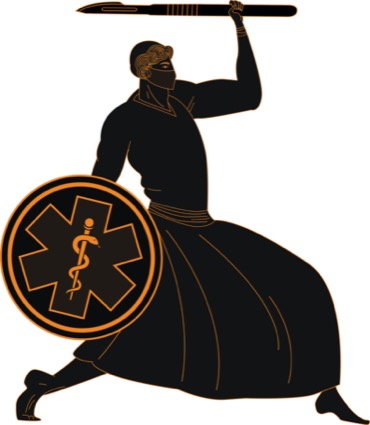
Most will recall that in the Greek epic poem, “The Odyssey,” the warrior Odysseus is desperately trying to return home after war. As the gods on Mount Olympus argue over his fate, the warrior fights to be reunited with his wife and son, a very familiar narrative in ancient Greek literature (nostos). In the 17th century, nostos became medical terminology when the suffix “–algia” was added and homesick soldiers at war were diagnosed with nostalgia. Historians have always hesitated to assign authorship to a single writer named Homer. Rather, the collection of poems is more likely an example of an oral tradition. Ancient generations painstakingly transmitted historical and cultural elements through the heroic tales of gods and men. Thankfully, too, because between the blurred lines of fact and fiction we understand how they perceived life, love and loss. Thousands of years later, that emotional energy is still preserved.
By now, the newest surgery interns are on the wards and in operating rooms. To all of you, welcome. You probably feel overwhelmed and underappreciated, and if not now, then soon. The sheer number of tasks you need to complete in the course of a day will inevitably give you tunnel vision. To a degree, this is expected. But as you become more efficient, there will be opportunities to look up and observe your surroundings. The lesson, then, is to become efficient early so as not to miss anything—your patient’s nervous smile, the family’s concern, a kind gesture from an attentive nurse, the questioning looks of a new medical student. These are some of the human connections that will help sustain you through residency.
There is another piece of a surgical intern’s education that too often goes unnoticed: the stories. Beginning in your first academic conference, you will hear stories, dripping in nostalgia and embellished with time, offered up and passed around like feats of war. Try to clear the noise and listen to this coordinated performance as it crescendos in victory, decrescendos in disappointment, now with layers of harmony and dissonance from around the room—stories of surgery.

By this point, I have heard all of my attending’s stories at least three or four times. I can nearly predict the story based on the discussion:
Being a chief and walking the junior through the first half of a Whipple … Working two and three days straight … Standing on thick rubber mats in OR while using cyclopropane as an anesthetic … Evacuating a hematoma bedside after thyroid surgery … Extinguishing an OR fire during a tracheostomy … Putting a patient on cardiopulmonary bypass to repair a tracheal laceration …
I can even retell stories that were told by my mentor’s mentor. The care given to preserve these multigenerational stories is almost reverent. Be a part of that ceremony. Let yourself be transported back to that OR in 1981, where a newly minted chief struggles through a laparotomy in the middle of the night, or where a young surgeon is forced to make hard choices out of a tent in Afghanistan. The stories—big and small—are full of triumphs and failures, humor, wisdom and creativity. But they are not fantastic fables. The stories have a first and last name, and for the senior attendings, these are the events that shaped their careers.
To the July interns, you may be surprised to hear that surgeons are storytellers. We learn how to do it from day 1. Even more surprising is that a good portion of your first year will be consumed with how well you tell a story at the podium (think history and physical). To this end, every part of the story will be under a microscope. Each morning you will be corrected on the length, vocabulary, syntax, order and conclusion of your story, but I would argue that it is as much a skill as learning to throw a perfect square knot. Dedicate time to this skill and it will serve you well.
Even though surgery is and always will be an oral tradition, we strive to elevate surgical decision making above the level of anecdotal experience. Modern surgery exists as both an art and a science. The adoption of evidence-based medicine does not render the stories obsolete; rather, every question answered by statistics originally began as a story and they have been the impetus for change, not data. And the surgical texts that interns will pore over in just a few weeks—are they not reminiscent of Homer, seamlessly jumping between fact (evidence-based) and fiction (dogma)? Despite having undisputed authorship, each chapter is the accumulation of our collective experience, reproduced and passed down from surgeon to surgeon. And so to the new interns: Listen to the stories. After all, they are for you, to internalize and learn from.
They are your history.
“It is Surgery that, long after it has passed into obsolescence, will be remembered as the glory of Medicine. Then men shall gather in mead halls and sing of that ancient time when surgeons, like gods, walked among the human race.”
—Richard Selzer, “Letters to a Young Doctor” (1982)
Dr. Halgas is a surgical resident in El Paso, Texas. His column on surgical residency appears every other month.

